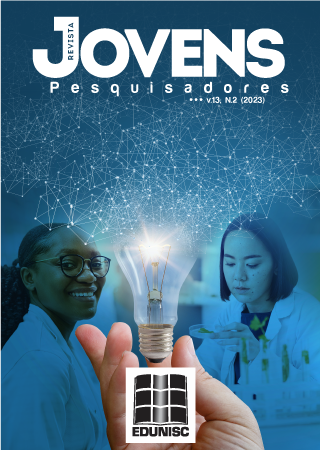PROBLEM-BASED LEARNING: A MATHEMATICS TEACHING PERSPECTIVE FOR ENEM
DOI:
https://doi.org/10.17058/rjp.v13i2.18451Keywords:
Problem-based learning, Active methodologies, ENEM, Mathematics teachingAbstract
This article seeks to emphasize the importance of Mathematics, its teaching and the application of active methodologies for the preparation of high school students who wish to take the National High School Exam (ENEM). For this, a workshop was held based on the UNISC Connections project, a sector linked to the Academic Pro-Rectory of the University of Santa Cruz do Sul. The Full Degree Mathematics course, inserted in the Project, holds the Mathematics for ENEM workshop. It aims to identify the difficulties presented by students in the contents charged in the National High School Examination. The development of the work is centered on didactic-pedagogical materials prepared by the scholarship holder and teachers, anchored in technological resources such as videos for the application of workshop activities and problem solving. Based on a proposed theoretical-practical model of activities, the workshop appropriates one of the active methodologies, which is problem-based learning. With its use in classes of high school students in 8 schools in the region of Santa Cruz do Sul, a change in the understanding and resolution of Mathematics questions in the ENEM was noticed. Also, the role of the teacher and the diversification in the methodology adopted for his classes ensures an improvement in student participation and encourages self-learning.
Downloads
References
REFERÊNCIAS
ALMEIDA, L. A. et al. A Importância das disciplinas de Matemática e Física no ENEM: Percepção dos Alunos do Curso Pré-Universitário da UFPB Litoral Norte, 2013. Disponível em: <http://www.prac.ufpb.br/enex/trabalhos/4CCAEDEDFLUEX2013818.pdf>. Acesso em: 17 mar. 2023.
AMORIELLE, I. S. Matemática no ensino médio e o ENEM. 2018. 58f. Trabalho de Conclusão de Curso (Licenciatura em Matemática) – Coordenação dos Cursos de Graduação em Matemática, Centro de Ciências Físicas e Matemáticas, Universidade Federal de Santa Catarina, 2018. Disponível em: <https://repositorio.ufsc.br/bitstream/handle/123456789/192497/TCC-Isabelle%20Amorielle.pdf?sequence=1&isAllowed=y>. Acesso em: 23 mar. 2023.
BRASIL, Parâmetros Curriculares Nacionais (PCNs). Ciências da Natureza e Matemática e suas tecnologias. Brasília: MEC/EM, 1997.
BRASIL, Parâmetros Curriculares Nacionais (PCNs). Matemática. Ensino Fundamental. Terceiro e quarto ciclos. Brasília: MEC/SEF, 1997.
BRASIL. Instituto Nacional de Estudos e Pesquisas Educacionais Anísio Teixeira. Relatório Nacional Pisa 2012. Brasília: Inep, 2013. Disponível em: <http://download.inep.gov.br/acoes_internacionais/pisa/resultados/2014/relatorio_nacion al_pisa_2012_resultados_brasileiros.pdf>. Acesso em: 15 mar. 2023.
BRASIL. Ministério da Educação. Base Nacional Comum Curricular. Brasília: MEC, 2013.
BRASIL. Ministério da Educação. ENEM Documento Básico. Brasília: INEP, 2002.
BRASIL. Ministério da Educação. Secretaria de Educação Básica. Parâmetros Curriculares Nacionais: Ensino Médio Parte III: Ciências da Natureza, Matemática e suas Tecnologias. Brasília: MEC, 2000.
D’AMBROSIO, U. Transdisciplinaridade. São Paulo: Palas Athena, 1997.
EVES, H. Introdução à história da matemática. Tradução Hygino H. Domingues. 5. ed. Campinas, SP: Editora da Unicamp, 20 11.
FIORENTINI, D. Alguns modos de ver e conceber o ensino da matemática no Brasil. In Revista Zetetiké. Universidade Estadual de Campinas. Campinas. Ano 3, n. 4, p. 1-38, 1995.
FONSECA, M. C. F. R. Por que ensinar Matemática. Presença Pedagógica, Belo Horizonte, v.1, n. 6, mar/abril, 1995.
MAMEDE, S. Aprendizagem baseada em problemas: características, processos e racionalidade. In: MAMEDE, S.; PENAFORTE, J. (org.). Aprendizagem baseada em problemas: anatomia de uma nova abordagem educacional. Fortaleza: Hucitec, 2001. p. 25-48.
RIBEIRO, L. R. C. Aprendizado baseado em problemas. São Carlos: UFSCAR; Fundação de Apoio Institucional, 2008.
SARAIVA, W. P. et al. Raciocínio lógico e seu desenvolvimento a partir da lógica matemática. V CONEDU, 2018. Disponível em: <https://editorarealize.com.br/editora/anais/conedu/2018/TRABALHO_EV117_MD4_SA13_ID5473_11092018083507.pdf>. Acesso em: 11 mar. 2023.
VERAS, W. S. et al. Exame Nacional do Ensino Médio (ENEM): Conteúdo matemático mais abordado e suas dificuldades. Research, Society and Development, v. 10, n. 6, 2021.
VITTI, C. M. Matemática com Prazer. São Paulo: UNIMEP, 1996.
ZALUSKI, F. C.; OLIVEIRA, T. D. D. Metodologias ativas: uma reflexão teórica sobre o processo de ensino e aprendizagem. In Congresso Internacional de Educação e Tecnologias, 2018.
Downloads
Published
How to Cite
Issue
Section
License
A submissão de originais para este periódico implica na transferência, pelos autores, dos direitos de publicação impressa e digital. Os direitos autorais para os artigos publicados são do autor, com direitos do periódico sobre a primeira publicação. Os autores somente poderão utilizar os mesmos resultados em outras publicações indicando claramente este periódico como o meio da publicação original. Em virtude de sermos um periódico de acesso aberto, permite-se o uso gratuito dos artigos em aplicações educacionais e científicas desde que citada a fonte conforme a licença CC-BY da Creative Commons. Creative Commons Atribuição 4.0 Internacional.
Creative Commons Atribuição 4.0 Internacional.


